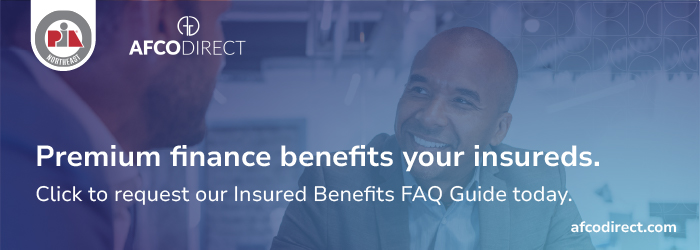News
NAIC releases 2020 profitability report
The National Association of Insurance Commissioners announced that it released its Report on Profitability by Line by State in 2020 last month. This report estimates and allocates profitability in property/casualty insurance by state and by line of insurance. Key findings from the report include that total premiums earned increased in 2020 for the 11th consecutive year, while losses incurred and loss-adjustment expenses remained flat; the countrywide direct return on net worth for the total p/c market decreased from 8.6% to 6.6%; and private-passenger auto premiums account for 36% of the total direct premiums earned in 2020.
Northeast states continue their recovery from 2021 storms
Connecticut Gov. Ned Lamont announced last month that an agriculture disaster declaration has been approved for Hartford, Middlesex, New Haven, New London, Tolland and Windham counties. This declaration makes farms in those counties eligible to be considered for certain disaster assistance from the Farm Service Agency to cover production losses from Hurricane Ida, such as emergency loans, as long as the eligibility requirements are met. Additionally, New Hampshire Gov. Chris Sununu announced last week that the Federal Emergency Management Agency extended New Hampshire’s request for a major disaster declaration in response to the storms that severely damaged Cheshire and Sullivan counties July 2-Aug. 2, 2021. Previously, the declaration excluded the storms from Aug. 1-2, 2021.
Northeast states continue to respond to COVID-19
Connecticut Gov. Lamont announced last week that he is directing the Connecticut Department of Revenue Services retroactively to enhance the 2020 Connecticut Earned Income Tax Credit from 23% of the federal credit to 41.5%. The additional tax state refund will provide needed economic support to low-to-moderate income, working individuals and families burdened by the pandemic and its negative economic impacts disproportionately. New Jersey Gov. Phil Murphy announced last month that he signed telehealth legislation (S-2559), which extends the requirement for health-benefits plans to reimburse health care providers for telehealth and telemedicine services at the same rate as in-person services (with limited exceptions) for the next two years. Additionally, this legislation charges the New Jersey Department of Health with conducting a study of the utilization of telehealth and telemedicine to inform future decisions on payment structure for these services. Also last month, New York Gov. Kathy Hochul announced that she signed legislation (S.6070-A/A.7324-A) that directs the New York State Department of Financial Services to conduct a study on certain impacts of the COVID-19 pandemic on small businesses and minority- and women-owned business enterprises getting loans; and she signed an executive order that suspends the in-person renewal requirement to extend property tax exemptions for low-income seniors and disabled individuals. To keep you updated on the latest COVID-19-related news, see your state’s COVID-19 resource page at www.pia.org and watch your PIA Northeast publications.
New Jersey and New York combat winter storms
New Jersey Gov. Murphy announced on Sunday that he declared a state of emergency for Atlantic, Burlington, Cape May, Cumberland and Ocean counties in preparation for a winter storm that hit the East Coast early this week. On Monday, it was estimated that up to 12 inches of snow would fall on southern regions of the state, and that parts of the state could experience coastal flooding. After the storm, parts of New Jersey had accumulated up to 13.5 inches of snow. Additionally, New York Gov. Hochul announced on Tuesday that she has directed state agencies to prepare emergency response assets as a weather system is poised to impact areas in Western New York and the North Country with lake-effect snow and high winds, which are expected to make travel conditions difficult with potential whiteout conditions. As you know, it takes 30 days for a flood policy to go into effect—so the time to start talking to your clients about flood insurance is now. To help you start the conversation, PIA offers resources through its Storm Info Central and PIA Design & Print. Storm Info Central provides members with state-specific updates and resources on topics such as storm damage, frozen pipes and fire safety. PIA’s Design & Print can help agents order materials to help their clients prepare for storm season. For more information on how Design & Print can help you, email Calley Rupp.
N.J.: State minimum wage increases for most employees
Gov. Murphy announced last week that minimum wage for most New Jersey employees increased to $13/hour, as part of legislation that he signed in 2019. According to the legislation, minimum wage will increase gradually to $15/hour for most employees by 2024. However, to lessen the impact on their businesses, small-business and seasonal employers have until 2026 to increase their minimum hourly wages to $15/hour. As of Jan. 1, 2022, employees working for small-business and seasonal employers are making $11.90/hour, up from $11.10/hour. Additionally, agricultural employers have until 2027 to increase their minimum hourly wages to $15/hour—employees in this sector now are making $11.05/hour, up from $10.44/hour. And, long-term care facility direct staff will make $16/hour, up from $15/hour.
N.Y.: Gov. Hochul signs legislation to expand public input in rules-making process
Gov. Hochul announced last week that she signed S.155/A.6267, to further enhance the ability of New Yorkers to participate in the rules-making process. According to the legislation, agencies can use digital, broadcast and teleconferencing technologies to garner more public participation; they can designate time for the public to address questions to agency personnel; and they can organize roundtable-discussion hearings—on evenings and weekends—to address the public’s questions. And, the public now is able to submit a valid petition to an agency to require that agency to hold a hearing on a specific rule or regulation.
N.Y.: Gov. Hochul announces plan for term limits and outside income ban for elected officials
Gov. Hochul announced on Monday a plan to institute term limits for the governor, lieutenant governor, attorney general and comptroller as the first proposal of the 2022 State of the State. Additionally, Hochul will propose a ban on outside income for statewide elected officials while serving in office. These reforms aim to increase accountability and trust in the integrity of the New York state government.
N.Y.: DFS directed to recommend covered childbirth benefits
Gov. Hochul announced last month that she signed S.4827/A.7315, which directs the DFS—in consultation with the New York State Department of Health—to prepare a report with recommendations on their review of covered benefits related to childbirth offered by all health insurance providers in the state. The legislation should uncover hidden costs and disparities in rates negotiated by insurers covering childbirth, and it will determine whether statewide standards need to be adopted.
N.Y.: Gov. Hochul announces increase in federal emergency home-heating aid
Gov. Hochul announced last week the emergency benefit amount per household—through the Home Energy Assistance Program—has increased by up to 42% from last year. The Home Energy Assistance Program offers federal funding to help low- and middle-income New Yorkers avoid having their home heating disconnected or exhausting their heating sources as fuel prices increase. Homes heated with natural gas now are eligible for $465, and homes heated with oil, kerosene or propane now are eligible for $965. HEAP began accepting applications for assistance on Monday for New Yorkers who already have used their regular benefit and who now are facing a heating emergency.
N.Y.: Gov. Hochul announces effort to increase homeownership in New York
Gov. Hochul announced last week that the state’s Legacy Cities initiative has been expanded to assist local community revitalization efforts and to increase homeownership opportunities concentrated in neighborhoods across New York. The expansion includes an increase in eligibility to include all municipalities that meet specific criteria regarding locally coordinated investment efforts in well-defined neighborhoods or areas within communities. And, $4.8 million in funding has been awarded through Legacy Cities to projects in Albany, Newburgh and Syracuse.
Vt.: Gov. Scott announces grants through the community development program
Gov. Phil Scott and the Department of Housing and Community Development announced last month that $3.5 million in Community Development Block Grant funding awards has been allocated to the Vermont Community Development Program. The funding will support 14 projects in all 14 counties, including affordable home-repair financing for low-income homeowners, improvements to community facilities and the building of new mixed-income housing.
Advocacy
N.Y.: PIANY successful in removing insurance application from new insurance disclosure law
Gov. Hochul signed legislation (S.7052/A.8041) last week that requires defendants in civil lawsuits to provide plaintiffs with complete information regarding any insurance policy that is relevant to the lawsuit. PIANY opposed this bill over privacy concerns because it included insurance applications as part of the required disclosures. However, after Hochul signed it, her office informed PIANY that chapter amendments to the bill would include the removal of insurance applications from the disclosure requirements. PIANY thanks its members who participated in the association’s grassroots campaign that urged Hochul to remove insurance applications from this law.
N.J.: Politics never sleeps
New Jersey PIAPAC works hand-in-glove with PIANJ to educate and develop relationships with state legislators. Constant communication is key in helping legislators understand the independent agent’s point of view and how certain legislation could damage the insurance industry and its small businesses. This education is vital as a new legislative session starts this month with some new faces in Trenton. Even though the state elections happened in November, NJPIAPAC continues to support legislators and attends fundraisers to ensure that the voices of independent agents are not lost in the shuffle in the state Capitol.
Technical
N.Y.: Regulation of independent livery drivers amended
The New York Compensation Insurance Rating Board announced last week that it amended 12 NYCRR 309.3 and added Section 309.4, which pertains to Independent Livery Drivers and the Independent Livery Driver Fund. The amendment adopts an emergency measure to ensure that there is no conflict between NYCIRB’s current regulatory language and the recent Cisnero v. Independent Livery Driver Benefit Fund case. Essentially, the case expanded the definition of independent livery drivers, and NYCIRB modified the language of the regulation to conform to this decision. The addition of Section 309.4 ensures that premiums are collected to cover the additional required coverage of the expanded definition of independent livery drivers.
N.Y.: WC classification code changes
The DFS has approved changes to the following NYCIRB manual classification codes: 2070 (Milk Depot or Milk Dealer & Route Salespersons, Route Supervisors, Drivers); 3030 (Iron or Steel Fabrication–Iron or Steel Works–Shop–Structural & Drivers); 3040 (Iron or Steel Fabrication–Iron or Steel Works–Shop–Ornamental & Drivers); 3041 (Iron or Steel Fabrication–Iron or Steel Works–Shop–Decorative or Artistic, Foundries, Drivers); 5102 (Door, Door Frame or Sash Erection–Metal or Metal Covered–All Operations to Completion); 6400 (Fence Erection–Metal–All Operations to Completion); 7999 (Hardware Store–Wholesale); 8013 (Jewelry Store); 9071 (Restaurant–Full Service–Including Entertainers and/or Musicians); 9072 (Restaurant–Fast Food & Drivers); and 9074 (Bar, Dance Club, Lounge, Nightclub or Tavern–Including Entertainers and/or Musicians).
N.Y.: NYSIF adds virtual feature to audit scheduling
The New York State Insurance Fund has made enhancements to its online Premium Audit Scheduling System. PASS now gives workers’ compensation policyholders and their representatives the opportunity to schedule a virtual audit appointment at a date and time that is convenient for them.
Educating insurance agents
Canceling personal policies—the rules to follow
Insurance companies can cancel or choose not to renew personal policies, but they must comply with laws from the state in which they do business in order to cancel them. The time frames in which insurers must notify insureds of cancellations or nonrenewals vary from state to state, and insurers also must comply with federal requirements if they are canceling or choosing not to renew a National Flood Insurance Program policy. Plus, additional requirements may limit certain types of cancellations—like midterm cancellations.
What to know about commissions
Independent insurance agents need to follow certain laws and regulations regarding commissions, service fees, referral fees and rebating. For example, licensed employees have different privileges that unlicensed employees do not when it comes to helping clients and earning commissions. And, these laws and regulations change depending on the state in which agents do business. It’s easy to break these laws—and agents don’t want to get into trouble with their state insurance departments.
Events
March 24-25: Connecticut Convention at the Hartford Marriott Downtown. Want to sponsor, exhibit or advertise?
ICYMI
ICYMI: Health insurers required to inform insureds of enrollment compensation
As part of the No Surprises Act—which was passed as part of the Consolidated Appropriations Act of 2021—insurers of individual health insurance coverage or short-term, limited-duration insurance are required to inform insureds about any direct or indirect compensation relative to the enrollment in an insurance policy. Additionally, No Surprises requires insurers to report agent/broker compensation information to the U.S. Department of Health and Human Services. However, HHS—along with other federal agencies—issued a Notice of Proposed Rulemaking, which asks for additional details around the No Surprises requirements. Indirect compensation is unclear in the legislation, and suggests that it should account for noncommission income generated by fees, bonuses, etc. In its notice, HHS proposed definitions of indirect compensation (along with a few other terms) that make direct and indirect compensation mean any form of consideration exchanged between the insurer, and the agent or broker. Additionally, the NPRM would require the compensation disclosures to be provided to policyholders before they finalize their policies, and insurers would be required to report to HHS on the actual amount of direct and indirect compensation paid by the insurer to the agent or broker for the preceding year annually. Implementation of the stipulations in the NPRM still are pending; however, HHS recommends agents, brokers and insurers to employ the new disclosure requirements as if the NPRM already is in force, because the agency plans to adopt a policy that reflects the proposals in the NPRM.



